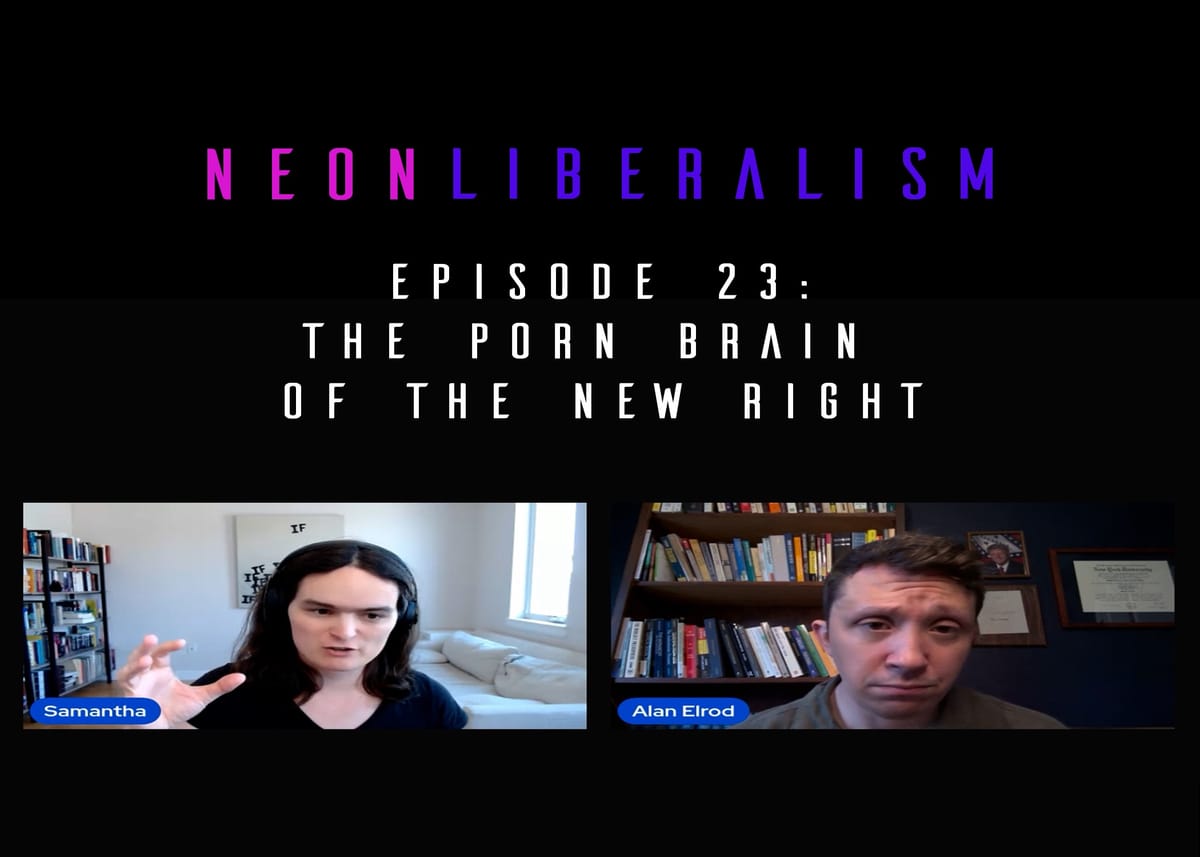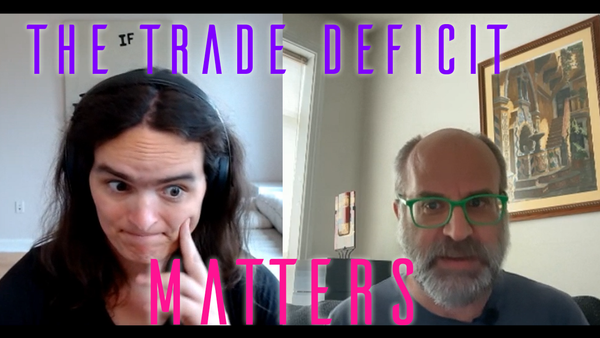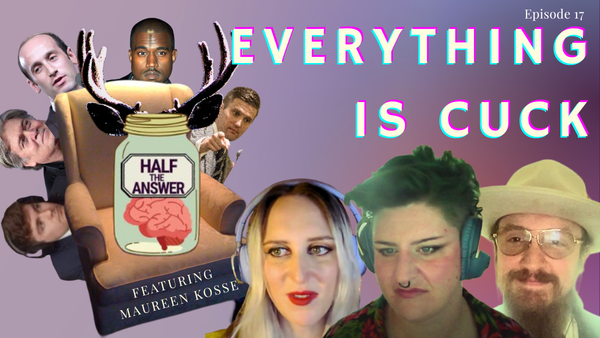Neon Liberalism #23: The Porn Brain of the New Right

Content warning: rape, pedophilia, and historical atrocities.
Join Samantha and guest Alan Elrod as they talk about the role of rape in conservative ideology, biopolitics as the Rosetta Stone of authoritarian reaction, and the pornographic fantasies that pervade the new right. Alan is the president and CEO of the Pulaski Institution, as well as a contributing editor at Liberal Currents.

Neon Liberalism can be heard on Spotify, on Apple, on YouTube, on Amazon, and elsewhere via its RSS feed.
Links to essays on the subject from Alan and Samantha:
https://www.liberalcurrents.com/guys-win-andrew-tate-rape-politics-and-the-authoritarian-right/
https://www.liberalcurrents.com/the-new-gender-synthesis/
Full Transcript
Samantha Hancox-Li [00:09]
Hello and welcome back to Neon Liberalism, a weekly podcast where we talk about the issues of the day and try to put them in a little bit more of a historical and theoretical context. And this week, I want to talk about some pretty heavy stuff, because we live in pretty heavy times. But this stuff is sensitive, because we're going to be talking about rape, we're going to be talking about historical atrocities. We are probably going to be talking about pedophilia. So if any of those things are not for you, now is the time to sign off. But if you do want to understand how those things bear on the politics of today, on the things that are happening in our country, then stay tuned and to talk about them with me.
I'm very excited to have on Alan Elrod. Alan, welcome to the podcast. Allen is not just a but the president and CEO of the Pulaski Institution. He's also a contributing editor at Liberal Currents, and has recently written a couple of essays for us on this subject. So yeah, again, welcome to the podcast, Alan.
Alan Elrod [01:32]
I'm really happy to be here. Excited to do it.
Samantha Hancox-Li [01:36]
Alright, so I guess to start with, let's talk about that essay you wrote, "Guys Win." Tell me about "Guys Win."
Alan Elrod [01:47]
That essay was something I'd been thinking about for a while, but the news story that sparked actually writing and filing it was the Tampa Bay Young Republicans extending that invitation to Andrew Tate and his brother in the wake of the Trump administration going above and beyond to get these guys back to the United States.
For the uninitiated, Andrew Tate is an absolutely malign figure of the internet who spouts a lot of misogynistic, violent advice, mainly to young men. He basically runs what I'd call a weird sort of get-rich-quick influencer School of Masculinity on the internet. The reality is that most of his audience are young men—teenage boys and boys in their early 20s—not really anybody older than that.
He's publicly talked about abusing women, and there are very severe allegations against him in multiple countries by women in terms of physical abuse, and obviously the most heinous being the charges in Romania of actual trafficking. So he's got, both in terms of his own words and the legal record against him, a very horrible track record of abuse and violence towards women.
I thought that was a good jumping off point to explore what's happening on the right in general, that Andrew Tate is such a big figure and someone that people are willing to embrace.
Samantha Hancox-Li [03:38]
Yeah, so again for the uninitiated in the audience, Tate is, like you say, an influencer with millions of followers on various social media apps. And he is this weird stew of financial advice and get-rich-quick schemes. But he's also what you would call a lifestyle influencer. A lot of it is him posing with big—he's kind of jacked, right? He's posing next to some expensive car or a raw steak.
Alan Elrod [04:13]
Right. He's a former kickboxing champion, so he does have physicality that is impressive, especially to a lot of young men who I think are adopting this "looks maxing" idea of male physicality.
Samantha Hancox-Li [04:28]
Yeah, that's right. It's this whole package of masculinity that he's selling to young men. And it's a masculinity of violence, especially violence towards women. It's a masculinity of rape, which he talks about and has been accused of in very credible ways. It's a masculinity of getting rich quick without really working—that's a big part of it. He doesn't teach you how to do useful things; he teaches you schemes.
And he's not a minor figure. The Trump administration explicitly reached out and got him off in Romania, brought him to America. Like you said, the Tampa Bay Young Republicans have embraced this guy, and he's hardly the only one. This is a mindset that has clear parallels with the Secretary of Defense, Pete Hegseth, who has again been credibly accused of rape or attempted rape. The kind of guy that Republican female operatives wouldn't want to be alone around because he would just attack you. He loves taking his shirt off and doing workouts with the troops. This image of masculinity and violent masculinity is central to his whole persona.
And we can just keep going. If you get a little more esoteric, we can talk about the so-called Bronze Age Pervert. Tell me about the Bronze Age Pervert.
Alan Elrod [06:11]
Bronze Age Pervert is this persona built by a former Harvard student. I think it dovetails with Tate in a really interesting way, because the Bronze Age Pervert persona is this idea that not just that men are important and superior to women, but that masculinity is good and femininity is bad, to such an extent that women are, at the same time they can be objects of sexual desire, also disgusting and bad.
In fact, looking at the male body is even better than looking at the female body, because the female body, by being feminine, is necessarily worth less than the male body. Bronze Age Pervert's whole thing, and I guess the way I think it really intersects here, is this idea that not only are men superior to women, not only do we need to recover masculine virtues, but masculine virtues also include this frankly kind of homoerotic idea of male physique and beauty. Male beauty is actually superior to female beauty. It's not just that male strength is superior to female strength, but the physical form of men, when it's maximized—when it's sculpted and physically fit and muscular—is actually more beautiful than a female body.
I think that's a really important element of this, which opens up some strange avenues of conversation about the way this stuff does and doesn't actually relate to sexual attraction, as opposed to conversations about power and disgust.
Samantha Hancox-Li [08:06]
Yeah, I think that's all correct. A little more context on the Bronze Age Pervert: he's a relentless poster, and you can find him on Twitter. Mostly what he posts will be a picture of a young, muscular dude, and then a really brief, tweet-long fantasy about how that dude is on his way to commit rape and murder. That's what his output is.
He's also published a book, "Bronze Age Mindset," that has become a cult classic on the right. There's actually a picture out there of an anonymous account on Twitter where they've taken the Bronze Age Mindset book, holding it up and taking a picture saying, "We made it." What's in the background? The Rose Garden of the White House. This is somebody demonstrating, "No, but seriously, I am a staffer in the White House. I brought this book here. This is the ideology that I endorse."
What I want to talk about today is why these guys are all rapists, why their ideology is suffused with rape, why this is connected to the authoritarian turn in our country, and how it connects to pornography. That's the other thing about the Bronze Age Pervert especially—there's a very pornographic aspect to the kinds of fantasies and ideologies these people are trafficking in.
I want to wind it back to the new right and what's going on with the new right. But I want to start by talking about history, to emphasize that this connection between misogyny, authoritarianism, and rape isn't new but has historical precedents.
The Nazis were basically obsessed with this stuff. If you read what Hitler wrote and said, what he communicated he was trying to do, and then what they actually did, this stuff is all over it. He's famous for the Holocaust, but that's not the only horrible thing they got up to. One of the lesser-known projects of the Nazis was the so-called Lebensborn program—basically weird breeding camps for Aryan women, where young German or "German enough" women would be brought in just to be pregnant, pumping out babies, and then those children would be fostered to SS families.
Additionally, it was a project of stealing children from Eastern Europe, children who were deemed by the state to be "Aryan enough," stolen from families who were murdered and then brought to SS families in the Reich.
That's a little bit heavy, and I know you've given other examples in your text about this. It's not just the Nazis we're talking about here. This is a pervasive thing that runs throughout 20th century authoritarianisms. So I'm going to ask you, what's the Falange? Unless you're a huge history nerd, you probably don't know what the Falange is. What are the Falangists? What's up with that?
Alan Elrod [12:37]
Well, I think a lot of people when they think of fascism, they think of Hitler, and they probably think of Mussolini. They don't as often think of Franco's Spain. The fascist movement in Spain is under-studied. There are many great scholars talking about Spanish fascism, but in the popular imagination, people think Italy, maybe, and they certainly think Germany.
But the Francoist movement is really important because it does some things that neither Germany nor Italy are doing, and that is that it has this deeply religious element, this very Catholic element to it. So the Falange under Franco is infused with this mixture of fascist ideology with Spanish iterations, but also very conservative Catholic ideas about family and procreation.
I don't want to mix contemporary conservative Catholicism with what this is, but there are Catholic principles there in terms of the use of contraception, the role of women in the family, that all get applied through Francoist politics. What's really important to understand is that this was something that men and women both participated in. When you look at the women's organizations on behalf of the Falange, you have women themselves advocating for this very submissive place in the home.
When I say submissive, I don't just mean they're saying you should listen to your husbands. They're saying that the purpose of a woman in the house is the pleasure of the man—sexual pleasure, feeding him, and then having children. That's it. That's the function, and this party advice is directly given, saying women should have sex with their husbands when they want, not worry about their own pleasure. Obviously, reproduction is the optimal outcome, but that's it. That's your job.
I think it's really important to understand that women are also advocating this for other women. It's important to internalize that there are programmatic and personalist elements to how this stuff operates. So you have both institutionalized aspects of misogyny and what I think we would call institutionalized marital rape in Spain, because what you have is essentially a top-down party position that says women should sexually submit at all times, and it's irrelevant what they want, when they want, and if they're pleased. That's essentially the party saying marital rape can happen at any time in this country, and that it's good.
So you have that, you have Lebensborn, but then you also have, in the form of the actual leaders—Hitler and Mussolini and all sorts of individual people—these very rapacious lifestyles and abusive attitudes towards women. I think that's an important intersection: you have the programs themselves that treat women as stock or as some other kind of objectified thing within the fascist framework.
Franco is not as concerned with race hygiene as Hitler is, so the Lebensborn program is very much about the hygienic perfection of the Aryan race. The Francoist project is more infused with the idea of Catholic virtues of the household, and how men and women are supposed to exist in the household, and how that's supposed to replicate society in terms of the patriarchal structure.
So they're distinct, but what you have in both cases are programs that are deeply misogynistic and institutionalized rape, and then individuals operating within those systems who are constantly leaving a wake of victims behind them. That's where I was trying to position the essay—this intersection between the programmatic ways in which fascism embeds rape into its politics, and then the personalist ways in which a lot of these people are themselves textual criminals.
Samantha Hancox-Li [17:25]
That's important to emphasize. Mussolini is really the exemplar here. If I understand correctly, he was a rapist before he was a fascist.
Alan Elrod [17:38]
He was a rapist before he was 20.
Samantha Hancox-Li [17:45]
Yes, that on a personal level, he—how to put this—there's this distinction you might think exists between "we want to have a national policy that produces these kinds of outcomes" versus "my personal life and how I want to structure it and relate to other people." But in the authoritarian programs, they're always deeply connected.
Mussolini was a rapist, Mussolini was a thug. Mussolini was always obsessed with power, violence, and domination, and when he comes to power in Italy, part of what he does is take these personal obsessions and project them outwards into international policy.
I don't know as much about the personal life of Francisco Franco, but certainly you can see related obsessions with Hitler. Was Hitler a rapist? We don't really have as clear evidence for that. We do know he was a pedophile in the sense that—not Leni Riefenstahl—what's her name? The mistress? Sorry, his wife?
Alan Elrod [19:05]
Eva Braun.
Samantha Hancox-Li [19:07]
Eva Braun, thank you. She was 16-17 when he married her. He specifically chose a very, very young woman. And this, again, shows up over and over again in these authoritarian regimes.
Obviously, we could also talk about the Japanese fascist project, which functionally is what they were doing. They didn't really call it that, but it has very close parallels with the kinds of imperialistic, nationalistic projects that the European fascists were engaged in. We could talk about the comfort women program, which was institutionalized rape without the fig leaf of marriage or Catholic procreation, but just the forcible enslavement and mass rape of foreign women, especially Korean women.
And we could also talk about the obsession with masculinity and the masculine body that pervades these fascist movements. I don't know if you want to say something about that.
Alan Elrod [20:38]
I do. I think we talked a little bit about the perfectibility aspect with someone like Bronze Age Pervert. But obviously, the male body is an obsession for Hitler, the male body is an obsession for Mussolini in a lot of ways.
Certainly with Mussolini, there's this lineage of Italian fascism going back to Rome and the Roman traditions of male physical virtues. With Hitler, the Olympics happening in Germany after Hitler's in power is a perfect showcasing of all this—a giant opportunity to show off the physical virtues of German males, which is what Hitler dreamed of.
I find this relationship between the male body as something that's meant to be admired and aspired to, and the female body as something that is supposed to be dominated, really interesting. It's grotesque, but I think it's really important.
People talk about rape today in a much more productive way than it used to be, and a lot of people say it's not really about sex, it's about power. I think that sort of misses the point, because it's about both—it's about sex and it's about power, but it's also about attraction and disgust.
When I brought up the Spanish case, the "wolf pack" case, which is why I tied the history of Spanish Francoist fascist thinking into things—these men who commit this gang rape in Spain, their text messages have all these really explicit things about "going to blank a fat girl." There's the sexual component, but they're clearly reveling in this idea of making it disgusting and being repellent. The men are all hyping up each other's sexuality and virility and virtue and strength, and at the same time, they're not just denigrating women as objects, but wallowing in the idea of women as something repulsive, even as they're talking about wanting to have sex with them.
You can't disentangle all this stuff about the male body from this really negative discourse about the female body, because when it's not being talked about in the capacity of reproduction, it's often being talked about in ways that are about revulsion.
Samantha Hancox-Li [23:52]
I think that's right, and I think this shows how what you're talking about—an aesthetics of sexual attraction or sexual disgust, a kind of submerged homoeroticism or disgust at the female body—is tied to both a politics of authoritarianism and a classic sexist worldview in which men are superior in every way and women are inferior in every way. It's very hierarchical thinking.
You can compare this to other kinds of patriarchal thinking. The classic Catholic thinking is complementarian thinking—that's the real old Catholic tradition that there are male virtues and female virtues, and each one is important, and they fit together in a particular way to form the natural human unity, and everybody's supposed to be valued. Everybody's supposed to be a child of God. That's not really how authoritarians and fascists talk about men and women.
Alan Elrod [25:12]
No. Well, I think that's really important to tie together because of JD Vance. You've mentioned the staffer taking the photo, but JD Vance follows Bronze Age Pervert. I'm far more troubled that the Vice President of the United States follows this guy online than that some staffer in the West Wing reads Bronze Age Mindset—that's awful too, but still.
JD Vance is a convert to Catholicism, but I would argue that a lot of his ways of expressing Catholicism do not line up with the much more positive version. There is a version of these kinds of ideas that arcs towards harmony and people being cooperative.
Samantha Hancox-Li [25:42]
To be clear, I don't endorse complementarianism, but it does seem more benign given the alternatives.
Alan Elrod [26:00]
There are conservative religious ways of thinking about sex and gender that are not designed by themselves to be oppressive. Vance seems very much drawn to the ones that are, so it seemed like a good place to insert JD into the conversation.
Samantha Hancox-Li [26:22]
JD is an interesting figure, because he is really where a lot of this stuff comes together in the administration. He's far more tapped into this kind of idea than Trump is. He's clearly swimming in what's sometimes called the Neo-reactionary movement online, and he clearly has deep connections with a lot of really radical, basically fascists and Nazis online.
I want to get back to how that connects to his pro-natalism and related matters. But first I want to kind of present what we've been talking about as a puzzle. This is something I've been thinking about for a long time. It first came up when I was trying to figure out why all the TERFs are racist—because they are, they're not subtle about it. And then also, why are all the racists misogynists? And why are all the authoritarians racist misogynists? Why do these things always seem to go together?
There's a view in which these are all just kind of independent axes. There's one kind of prejudice you might have against women, and another kind of prejudice you might have against this race, and a different kind of prejudice you might have against this nationality, and authoritarianism is a political structure you might be attracted to because you think monarchism is good. They all seem independent. But if they're all independent, why are they always linked in practice?
As they very clearly were for the historical fascist projects we're talking about, which always had this very nationalist, oftentimes exterminationist logic to them, that also had a deeply misogynist, rapist logic to them, and that also had a political, authoritarian logic to them.
For me, the answer is to understand that there is a coherent vision of the world that they're all attracted to, and it's a vision that I like to call a biopolitical vision. Maybe you hear this, and you think I'm talking about Foucault or various kinds of mid-century French thinkers, and that's not really who I'm referring to.
There is an older tradition. The term biopolitics, I believe, was coined by Rudolf Kjellén, a European thinker who wrote a book called "Stormakterna" (The Great Powers). He's hardly the only one, but he puts it all together in a book and gives it a good name.
He has a vision of nations, not as political communities, not as a community of persons who have interests in rights and property and community, but as biological communities first and foremost. For the biopolitics thinkers, the vision of the nation is as a community of biologically reproducing human beings set against other communities of biologically reproducing human beings, competing for scarce resources in a zero-sum world.
I think that's fundamental to how they see the world. And once you put all those things together, you start to get racism and sexism and misogyny out of it, because you think, "Well, if we're going to reproductively compete with the other communities, we need to be having more children." They'll always talk about this.
I have a quote I'm going to read out. It's from Wilhelm Schallmayer, a eugenicist from the 19th and 20th centuries. It's going to sound like somebody posted it on the internet yesterday:
"If the flabby views and comfortable habits for which Neo-Malthusians and feminists make propaganda become dominant among the white civilized nations, the White race will not only not expand over the earth, but will doubtlessly, sooner or later, either be militarily defeated by the tough and rapidly growing portion of the yellow race, and then be gradually replaced by its reproductively superior competition until the white race disappears, or if hostilities are avoided by all sides, the peaceful immigration of the fecund Asiatics will lead to the exact same result."
Alan Elrod [31:12]
Yeah, that sounds like something off of a fortune board. Nationalism is my academic background, so it's always interesting to me to talk about this kind of stuff.
You can find these echoes in other political ideologies. Hitler's Racial Hygiene logic is very similar to this—that there are races, that the world is a competition between races, and that the way you win is by waging war, physical conquest, but also war science, through perfecting the racial population through experimentation and eliminating "bad genes" and reproducing in a particular way. You don't want to keep people with disabilities, people with what you consider to be "defects," and for people like this, that usually includes not just physical or mental disabilities, but also "disorientations"—being gay, being transgender, being anything else.
The racial war that Hitler envisions is similar to this, but you also see it in subtler ways from pro-natalists. The reason I'm always wary when the pro-natalist conversation comes up is: if you want to do something about declining birth rates, that's not unreasonable. We have a serious challenge. Birth rates are declining. We've built robust advanced economies on the backs of a certain kind of population trend, and it's going to be hard to sustain some welfare benefits when the population pyramid flips. Those are real conversations to be had.
A person who says we should be worried about declining birth rates is not necessarily a stealth Nazi, but what happens when they also talk about their concern about immigrants coming in, or about other countries' birth rates being higher than ours, in a way that suggests that there's going to be too many of a certain kind of person and not enough of another? That, unfortunately, is very commonly the second and third thing you hear when they start talking about this stuff. That's where I get very worried.
You start to say, "Okay, this is not just about fixing a particular problem. This is about a concern that white people, or people of a particular background, are going to be 'outnumbered.'" Sometimes there's a concern that they'll be "bred out of existence" by white people and non-white people having sex with each other and producing children, which is supposedly a terrible thing that will "dilute the race."
So all of these things mix together. I've been writing about pro-natalism for a while. In 2023, I went on an episode of Dr. Phil and talked about procreation. They did a debate on procreation. There was me, this wonderful researcher Britt Ray from Stanford who writes about the psychological impacts of climate change on millennials and Gen Z and their decisions to have kids, and then there were people with some pretty out-there ideas.
One of them was this guy, Jesse Lee Peterson, a racist radio host out of LA who's buddies with both Nick Fuentes and Sean Hannity and Dennis Prager. He is Black, but he declared on that show that we needed to have more white babies and, in his own words, "because Black people destroy and white people create."
I think it's really important to understand that Dr. Phil didn't give this guy a platform—he already had a massive platform. These ideas are out there, and they're out there in ways that you may not expect to encounter them.
Samantha Hancox-Li [36:19]
The genius of America is that we have invented multicultural, multiracial fascism. Somehow that happened.
But I think your broader point is important. When I talk about bio-politics and this bio-political view of human societies and human nations, it's a structure that you can fill out in very different ways, and has been filled out in different ways. You can define the boundaries between "us" and "them" in all kinds of ways. You can try to maximize your reproductive fitness in various ways.
The Falange has their idea where it's all traditional Catholic values and marital rape. But they're not running rape camps. They're not conquering other nations and stealing children, which the Germans are doing. The Japanese are running rape camps. You can flesh this out in various ways, but I think it's a useful way of seeing a common thread that runs through all these different ideologies and political projects.
I think it also connects to authoritarianism in an important way, in part because people take this fundamentally patriarchal model of the family and project it onto society. We are going to run society as if it's a family, where the father, the patriarch, is going to be in charge, and his word is going to be law.
This connects why these leaders are the way they are, and why these political structures are the way they are. It's all united by this zero-sum, domination-obsessed mindset that can only process relations between human beings as relations of dominance and subservience.
Alan Elrod [38:38]
Daddy's back, right? That was Mel Gibson's comment.
Samantha Hancox-Li [38:41]
Yes, Mel Gibson got on TV and said, "It's like Daddy's back and he's taking his belt off."
Alan Elrod [38:50]
Right. He's gonna hit us. Dad's back. He is gonna hit us.
Well, the household thing is compelling because it's actually a very effective kind of "common sense" way of talking about politics. People use the household metaphor in non-malicious ways all the time: "You've got to get your household finances in order" or "You've got to take care of the little things in the house so it doesn't fall apart."
People use household and family as metaphors for politics because it's the most intimate unit that we live in. Whatever kind of family you have, even if it's a more non-traditional family unit, that most intimate level of relationships is what we're operating in on a daily basis. So metaphorically, we scale out a lot of times when we think about politics from that place.
But you can always find that thread with the authoritarian stuff, where it's like, "Yeah, but in this version, Dad gets to hit us, and being hit is good, and being dominated is good, and being submissive is good."
Samantha Hancox-Li [40:06]
I think I want to pick up on this line—being dominated is good and being submissive is good—because there's the family metaphor, but these days, there's a lot of porn metaphors. Let's talk about them. Unfortunately, content warnings again, but we have to talk about porn because it is just all over how these people think and act.
There's one quote in your "Guys Win" article. JD Vance goes on a podcast with one of these far-right "luminaries," and this guy has also written a blog post in which he says that his offer to feminists is rape—that he offers feminists rape as an olive branch.
What he's trying to suggest is that there's this world we live in where men have forgotten how to be men and women have forgotten how to be women, and men are emasculated, and women are masculinized. What we need is rape, and rape will reset the natural order, and afterwards, people will be happy about it. Men will be happy to be men, and women will be happy to be women.
You can just see that this is all over certain kinds of pornography. It is a porn storyline about dominance and submission, and I think that is part of what they're selling to young men. When we bring it back to Tate, to his aspects as a lifestyle influencer—this image and story that he's selling to young men—part of what makes it attractive is a certain degree of sexual excitement, a certain pornographic gloss on a political program.
Alan Elrod [41:38]
Yeah, I think talking about porn allows us to talk about a few of the different things we've been building up to. One is this relationship between excitement and disgust, and I think you can see this on the right from both the secular new right and the religious new far right.
On the religious side, there's a lot of "porn is evil, porn is bad, porn is destructive," but then we find out that a lot of these people consume porn—and not even just legal porn, but also abhorrent content. We've had numerous people on the religious right outed in the past few months for child pornography.
Samantha Hancox-Li [43:01]
Not just child pornography, but also just pedophilia—actual "they had sex with a child" pedophilia. And we'll come back to that.
Alan Elrod [43:12]
And on the secular right, I think it's more about self-control. It's about this idea that porn is actually effeminizing you—porn is making you weak and effeminate. You're supposed to be a man who's excited by sex with women, but you're also supposed to reject pornography as beneath you. That's the secular argument.
The religious one tends to have more to do with moral repulsion, whether they actually feel that or not. And the secular side is a little more around the idea that porn is a weakness. Real men don't need porn, because real men go out and take what they want from the world, including sex with women. The implicit idea is like, you go and you get sex, whether they want it or not.
Samantha Hancox-Li [44:05]
Well, I think this is also maybe a place to talk about "trad wives." The trad wife is a style of influencer where it's always a woman, and she gets herself dolled up to the max in a kind of 50s aesthetic, or a cottage core aesthetic, or a pastoral aesthetic, but an extremely sexualized one. Usually she'll be popping out of her dress in some ways, and then she'll do weird household tasks, like making cookies or doing the dishes or carrying eggs around.
Alan Elrod [44:47]
The raw produce is always the weirdest part of it.
Samantha Hancox-Li [44:50]
The whole trad wife influencer thing is interesting to me, because it's basically just soft-core porn, but they don't admit that. I think this gets to what you've been talking about—these people have a strange relationship with porn, where their politics are very pornographic, even as they themselves are like, "No, no, we shouldn't consume porn because it's disgusting or effeminizing." So you have these substitutes that are this weird blend of both political content (the trad wife influencers are selling a vision of a patriarchal society) but they're also kind of selling sex.
Alan Elrod [45:20]
The trad wife thing popped in my head at the very beginning of this conversation, when we were talking about women in Franco's Spain and the advocates for women saying, "No, this is good. This is your place." It's really important to understand that there is also an apparatus of women actually helping to build and sustain this stuff.
Samantha Hancox-Li [45:50]
Yes, as Catharine MacKinnon would have put it, it's the eroticization of female submission. And some women, clearly the trad wives, get something out of that, or they pretend to, anyway. The story they're selling is not purely an ugly story—there's a kind of an unpleasant fantasy of submission. Part of the core story is that everybody's happy afterwards.
In practice, it never really works like that. People don't like being trapped in the house, in the kitchen, having children all the time. No one actually likes that very much. But you can tell a story about it.
I do want to talk a little bit about pedophilia. If you follow this stuff at all, you'll have heard this phrase "pedocon theory," which is basically the suggestion that pedophilia is very common among conservatives and conservative politicians.
Again, this is one of those self-censoring facts that people find so uncomfortable to talk about that they don't even want to recognize them. But Republican politicians have repeatedly gotten busted for grooming children, and I think the grooming thing is important. What they are trying to do is make these pornographic fantasies real, and that's harder to do when you're confronting an adult human being who has a certain level of emotional maturity and autonomy. But children are children, and it's easier to mess with their heads. It's easier to groom children, and that's what they're doing. They are trying to groom children to participate in these kinds of sexual fantasies of dominance and submission.
Alan Elrod [46:57]
The top line for me on a lot of this stuff is, if you're just constantly talking and writing about sex in the way that some of these people are—I don't mean the way that a scholar of sex does, but in this never-ending, always at Full Tilt hysteria about sex—my tendency is to assume that really must dominate your life in a way that it doesn't dominate mine.
When people say it's pedocon theory, I'm like, well, this is where this particular approach to politics has become very popular—this kind of obsession with who's having sex with whom, when they're having sex, how they're having sex, whether someone else is having sex the way you think they should be. These are preoccupations I just don't share, and I think they tend to be indicative of a disordered level of obsession about different people's sexual predilections and habits. It's usually this kind of first warning sign that someone potentially has a frankly disordered relationship to sex in general.
Samantha Hancox-Li [49:39]
I think there's an example where, like you say, being obsessed with sex, and you dress it up in this moralistic language about how it's awful and you're against it, and you hate pedophilia, and you're trying to stop sex trafficking, and you make a whole movie about how you're a hero fighting against sex trafficking. And it comes out that the makers of "Sound of Freedom," this movie about them fighting the plague of sex trafficking, are sexually assaulting women and children.
Alan Elrod [50:16]
Right, and you know, Josh Duggar's arrest over child pornography—this all comes back to what I think is helpful to think of as this dynamic of attraction and repulsion. You can't separate it—they're disgusted, but they're transfixed, and yet they're repulsed, and yet they're obsessed. Those two things are constantly happening at the same time. It's this fixation, but there's this constant subtext of disgust, and revulsion, and rejection.
It's a deeply disordered way to talk about this stuff. I think it's really important to say over and over again, because what they're trying to do is say that their view is the natural, proper order. It's actually really important to say it is deeply disordered and deeply unhealthy. That should be obvious, but it has to constantly be reasserted, because the thing that makes it frightening is this constant insistence that their view, this deeply warped view, is actually this received simple, obvious order from nature.
Samantha Hancox-Li [51:40]
I think that's very interesting, because, like you say, they're always insistent that this is all natural and normal, and yet at the very same time, they are going through enormous lengths to make it happen—to chop the world into conformity to what they think it ought to look like, what this patriarchal order ought to look like.
You can see it in the exaggerated performances of masculinity and femininity among the right wing—a concept that I called "reactionary camp" in a recent essay for Liberal Currents.
Alan Elrod [52:28]
I love this idea. This is a really wonderful idea.
Samantha Hancox-Li [52:32]
And you can just see, to be blunt, a lot of these figures on the right, they're all on steroids. Like, how do you look like that when you're 50 years old? Steroids. That's the short answer. How do you get to be that large without just being a professional bodybuilder who does nothing but bodybuild? Steroids.
And similarly, Republican women go through enormous lengths to look a certain way—the plastic surgery face, the dyed hair, the pancake makeup, plastic surgery on the face but also the rest of their body, to create this idealized, almost beyond the point of "that looks good" to an over-exaggerated, campy portrayal of what they think a properly feminine woman ought to look like.
Alan Elrod [53:39]
And we're seeing this trickle down into society more generally. We have a serious problem with young boys taking steroids and trying to achieve looks that are not physically possible for their age, and the things that they are doing to try to get to that point are deeply dangerous for their bodies, especially at a point where they're going through a lot of changes in development.
We talk a lot about the internet's effect on young women in terms of body dysmorphia. It is having a devastating effect on young men.
Samantha Hancox-Li [54:15]
Yes, that's true. It's again something that people don't want to talk about. Yes, young men are under an immense amount of body pressure, and they are not reacting to it in a healthy way in many cases. A lot of them are clearly consumed by a feeling of inadequacy, that they have to match these hyper-masculine, hyper-idealized images that are pumped into them from their phones.
There's lots of people who will say, "I've got a pill, I've got a shot, I've got a surgery, I've got a diet"—anorexia is a real problem—"that'll put you on the path to being the perfect man."
I think this gets to what you've been talking about—this disordered aspect to it, this insistence that this is natural, but also this tremendous anxiety that it isn't, and how this is just driving a lot of really disordered behavior, a lot of disordered sexual behavior on the right that underlies so much of their politics.
So getting on towards the end of our conversation here—it's been totally cheery and happy—I thought I'd ask you a question. What do you think we should do about this? How do we respond? How do we react? What is a better future we can get to from where we are?
Alan Elrod [55:40]
Well, this actually, especially the stuff we're talking about with young men, really dovetails with the kind of preoccupations I have in general along Robert Putnam's lines of civic disorder and engagement.
Form relationships in your community. If you're a parent, reach out to those kids in your life, the young men in your life especially. But if you have the opportunity to do something with like Big Brother, Big Sister, to sponsor a youth sports league—this seems silly, but you have to present alternative models.
Andrew Tate is effective because he's in your phone. I'm just going to say this right now because it sounds scary, but also because it's probably true: if you have a young man in your life, Tate is in their phone and in their head right now, giving them a version of what life is supposed to be like. If you don't give them an alternative, that's what they have.
If you don't give them people saying there are other ways to be virtuous, to be successful, to be masculine—frankly, if people want to feel masculine, that's not bad, but you have to give them a way to feel that and be that that isn't this deeply horrifying, disordered thing. You can only really create that by going out into the world and creating places where people can actually find those supports, whether it's sports leagues or book clubs. Men can join book clubs. It doesn't have to all be sports and athleticism.
Samantha Hancox-Li [57:07]
Tabletop role-playing.
Alan Elrod [57:13]
100%. I love D&D, and I run games for friends. Do this—create these places where there are intergenerational conversations happening, especially intergenerational conversations between men, where young men see there are ways to be in the world as a man who is confident and kind and also kind to themselves. Because they're not going to be kind to the world if they can't do that first—they're really not.
Samantha Hancox-Li [57:58]
I think that's exactly right. This is something I wrote about recently for Liberal Currents, called "The New Gender Synthesis."
Alan Elrod [57:54]
I'll say that right now. Everybody should go read it.
Samantha Hancox-Li [58:00]
I endorse this message. You should definitely read that essay. We have to give people a model like you said, where they can be strong but also kind, where they can embrace masculine virtues but also embrace feminine virtues—to be a complete human being, and not the parody of humanity that Tate and others are trying to sell. A parody that's based on fear and loneliness fundamentally, and that rejects human connection.
It sucks to be lonely, sucks to be young and to be lonely, but you can connect with people. You can find activities to connect with people that are not just posting on the internet. What that might be depends on you. For me, it's role-playing games. I know this sounds goofy, but I recognize we live in an atomized society, it can be hard to connect with people. A good, long-running tabletop role-playing campaign can keep you in touch with people for years—meeting your friends weekly, week after week after week. It's a real point of human contact that can be hard to find in this world, but everybody has something different.
Alan Elrod [59:20]
This will also maybe sound strange, but even for the things you want to do that are a little more alone, like reading a book, consider going and doing it in a public space. I know that sounds odd, but physically being around other people has an effect on us. You can go read down at the local library or a quiet bar, and being out in the world is still really good for you. I just think that it's so critical to be out around people, even sometimes just around other people doing their own thing.
Samantha Hancox-Li [1:00:07]
Yes, I think that's quite right. There is a way in which everything we've been talking about is so tied up with phones and social media, and the ability of social media to deliver straight to your eyeballs these idealized, perfect images over and over—an idealized world that is created via steroids and Instagram filters. If that is calibrating your internal brain sense of what men and women have to be, that is a disorder.
So fundamentally, if we want to combat the kinds of narratives, the kinds of sexual, misogynistic, rapist narratives that the new right is selling, we have to offer young people, especially young men, a better vision, a vision of a complete human life.
Alan Elrod [1:00:50]
Well, I think about this on transgender issues too, because for trans men who want to become men, or want to embody their manliness, you've got to actually offer them a roadmap for what it means in that transition, and a place for them that says masculinity is actually this wonderfully diverse thing that can accommodate so many different types of people and personalities and interests, and is good. Because I don't want people in that experience to think that the only path to manhood in this transition is this very specific, fixed thing that may not even be attainable.
Samantha Hancox-Li [1:01:52]
I mean, I think in my personal experience, trans men tend to have a better idea about masculinity—they've thought about it harder.
Alan Elrod [1:02:01]
Yes, they've thought about it for a long time.
Samantha Hancox-Li [1:02:04]
For them, it's not a prison, but something worth choosing. I think for a lot of men, masculinity is functionally a prison, but it doesn't have to be. There are ways out of it, and you can look to trans dudes and what they're trying to do with masculinity to see a freer future.
Alan Elrod [1:02:13]
That's a great way to put it.
Samantha Hancox-Li [1:02:20]
So much more to talk about here. Could talk about trans issues for far too long, but yes, Alan, thank you so much for coming on Neon Liberalism. This has been a great conversation, and I'm sure I'll see you around.
To everybody in the audience, thanks again for tuning in. I'm sorry there was no episode last week. As you may have noticed, I'm still coughing a little bit. I was quite under the weather last week, but hopefully we're back to our regular schedule.
As a reminder, Liberal Currents is a listener-supported publication, so if you want to support what we're doing, or to just be in touch with the community that we have on Discord, or the essays that we publish on Liberal Currents, just head on over to liberalcurrents.com and subscribe to our newsletter. Thanks so much for listening, and I will see you all next week.






